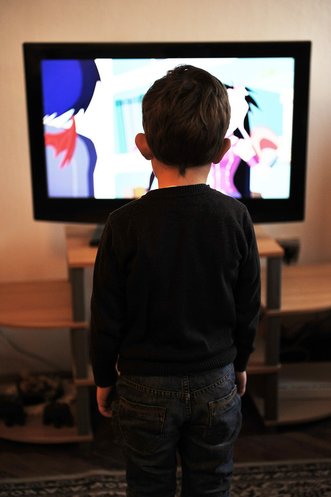Far from being the niche pastime it once was, in today's families, you'll be hard pushed to find a child who doesn't play video games in one form or another. And in almost every way, this is a great thing - playing games has been proven to have impressive, tangible developmental benefits for little ones, from teaching problem solving, to co-operation, and the all important hand-eye co-ordination.
There's no doubt games can be hugely beneficial for children - however, many parents are understandably concerned about the content their children may have access to. As games are much more advanced than they used to be, many may contain mature scenes, or provide opportunities for online interaction (or even voice chat) with strangers, leaving many parents with some concerns about how best to "police" what their little ones get up to.
But in fact, one of the easiest ways to keep an eye on things, and be sure your children are enjoying games safely, is to carefully choose where you put their console.
Video Games in the Bedroom
There are both pros and cons to having a console in a child's bedroom. On the plus side, letting kids play in the privacy of their own environment is a method of encouraging child development through experiential learning. Experiential learning is all about giving children a greater amount of freedom to explore and learn by themselves. Safe in the knowledge that no-one's watching, your children are more likely to experiment in games and try and figure things out for themselves, knowing that no-one's around to ask for guidance - and no-one's around to criticise if they get things wrong, either.

On the other hand, children with consoles in their bedrooms are much more likely to play before bed, which can have a negative impact on sleep due to overstimulation of the mind at a time when the brain should be starting to relax and wind down. It doesn't matter how old you are, the "just one more level" feeling is universal. The problem is, long-term fatigue could affect a child's performance at school, and could even begin to impact personality.
Unfortunately, there's no way (at the time of writing) to restrict the times at which your child can play through consoles themselves. The closest you come is on the Xbox 360, which lets you set a family timer, limiting how long your child can play for, but not when.
Parental controls are also important for bedroom consoles, as if you haven't yet set up adequate controls on the console, you also run the risk of your child playing games you wouldn't otherwise deem suitable if they can get their hands on them (like, say, borrowing them from a friend) - or, chatting to strangers online. With parental controls in place, this isn't an issue - but if you haven't yet set them up, it's a lot easier for children to play things covertly when they're out of sight, out of mind.
Video Games in the Living Room
If you really want to keep an eye on things, though, there's only one choice - sticking the console in the living room. One of the main advantages of setting up a console in the living room, or in a shared area of the home, is that parents can keep a close eye on the types of video games their kids are playing. Video games with higher age ratings have been described by some researchers as 'forbidden fruits for youth' - the more violent or graphic the game, the more the child wants to play.

Although research has also suggested there's no link between violent video games and violent behaviour, parents do have a right to protect their children from scenes that may be inappropriate for their age. The downside, however, is that children often hate being supervised if you don't go about it in the most tactful way possible (as you may have noticed or remember!). It has been suggested that parental supervision may even encourage deceptive behaviours, causing kids to be more creative in hiding their use of violent titles.
However, by far the biggest advantage of having the console in the living room is the potential for same-console multiplayer. Putting your games machine in what's arguably the busiest room in the house lets you create a cornerstone for family bonding, where siblings and parents alike can play co-op together, and learn to work as a team. While the PS4/PS3 and Xbox One/360 both offer plenty of potential for multiplayer fun, it's Nintendo's Wii U that's the really star of the show here, with a wealth of family-friendly games for all ages, many of which (like the excellent Super Mario 3D World) offer co-op support for up to four players. Whether you're just sitting watching your family play, or jumping in yourself, it can be great for family bonding - especially if you make a regular family multiplayer games night, where everyone can work together. Here's some top tips for a great family night in:
- Lay down some ground rules for behaviour. No one likes people talking over the cutscenes.
- Invest in rechargeable batteries. They'll save you a fortune, and having a few on hand at all times makes any emergency battery swaps much less painful.
- Start out with co-operative games before introducing competitive. While competitive multiplayer games can be a lot of fun, there is some potential for hurt feelings and little arguments, so it's best to stick with games where you have to work together, until everyone's found their footing.
Unobtrusive Supervision
So, where should children play video games? While many parents may automatically assume that playing in the living room is the safer choice, there really are pros and cons to both set ups, so parents should opt for the supervisory method that suits them and their family. One technique that has been explored in studies is co-playing, which could provide a happy medium between the two.
Playing a game in co-op, together with your child, but in a more personal space than the living room, like their bedroom, or your office, lets you monitor the activity in an unobtrusive way, while providing the opportunity for you both to engage in a common interest one-on-one. Siblings sit together while one plays, or a parent invites their children to watch them play a harder or slightly more mature game.

We're getting to the stage where more and more adults have grown up playing games with their family, be it siblings or parents. In the same way that people have touching stories about how their parents would read to them, or they had family Monopoly night, more and more people are talking about "Watching Dad play" and "Family Mario Party night." So, whatever decision you make, rest assured, it'll probably be a good one, and with the right games on hand (you can take a look at our family Game Finder if you need any suggestions), you'll be leaving your kids with memories that'll last a lifetime.












